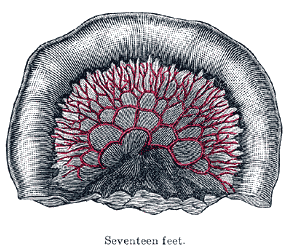Ileal vessels
REDIRECT Superior mesenteric artery
Ileal Vessels[edit | edit source]
The ileal vessels are a group of blood vessels that supply the ileum, which is the final and longest segment of the small intestine. These vessels are primarily branches of the superior mesenteric artery and the superior mesenteric vein.
Arterial Supply[edit | edit source]
The arterial supply to the ileum is primarily provided by the ileal branches of the superior mesenteric artery. The superior mesenteric artery arises from the anterior surface of the abdominal aorta just below the level of the celiac trunk.
- Superior Mesenteric Artery: This artery gives off numerous branches that supply the small intestine, including the jejunum and ileum. The ileal branches are numerous and form an extensive network of anastomoses, ensuring a rich blood supply to the ileum.
Venous Drainage[edit | edit source]
The venous drainage of the ileum is through the ileal veins, which accompany the arteries and drain into the superior mesenteric vein.
- Superior Mesenteric Vein: This vein collects blood from the small intestine, including the ileum, and drains into the portal vein, which then carries blood to the liver for processing.
Lymphatic Drainage[edit | edit source]
The lymphatic drainage of the ileum follows the arterial supply. Lymph from the ileum drains into the mesenteric lymph nodes, which are located along the superior mesenteric artery.
Nerve Supply[edit | edit source]
The nerve supply to the ileum is derived from the autonomic nervous system, including both sympathetic and parasympathetic fibers.
- Sympathetic Innervation: Provided by the superior mesenteric plexus, which decreases intestinal motility and secretion.
- Parasympathetic Innervation: Provided by the vagus nerve, which increases intestinal motility and secretion.
Related Pages[edit | edit source]
Search WikiMD
Ad.Tired of being Overweight? Try W8MD's physician weight loss program.
Semaglutide (Ozempic / Wegovy and Tirzepatide (Mounjaro / Zepbound) available.
Advertise on WikiMD
|
WikiMD's Wellness Encyclopedia |
| Let Food Be Thy Medicine Medicine Thy Food - Hippocrates |
Translate this page: - East Asian
中文,
日本,
한국어,
South Asian
हिन्दी,
தமிழ்,
తెలుగు,
Urdu,
ಕನ್ನಡ,
Southeast Asian
Indonesian,
Vietnamese,
Thai,
မြန်မာဘာသာ,
বাংলা
European
español,
Deutsch,
français,
Greek,
português do Brasil,
polski,
română,
русский,
Nederlands,
norsk,
svenska,
suomi,
Italian
Middle Eastern & African
عربى,
Turkish,
Persian,
Hebrew,
Afrikaans,
isiZulu,
Kiswahili,
Other
Bulgarian,
Hungarian,
Czech,
Swedish,
മലയാളം,
मराठी,
ਪੰਜਾਬੀ,
ગુજરાતી,
Portuguese,
Ukrainian
Medical Disclaimer: WikiMD is not a substitute for professional medical advice. The information on WikiMD is provided as an information resource only, may be incorrect, outdated or misleading, and is not to be used or relied on for any diagnostic or treatment purposes. Please consult your health care provider before making any healthcare decisions or for guidance about a specific medical condition. WikiMD expressly disclaims responsibility, and shall have no liability, for any damages, loss, injury, or liability whatsoever suffered as a result of your reliance on the information contained in this site. By visiting this site you agree to the foregoing terms and conditions, which may from time to time be changed or supplemented by WikiMD. If you do not agree to the foregoing terms and conditions, you should not enter or use this site. See full disclaimer.
Credits:Most images are courtesy of Wikimedia commons, and templates, categories Wikipedia, licensed under CC BY SA or similar.
Contributors: Prab R. Tumpati, MD

